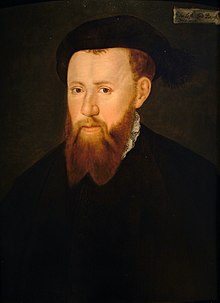John Braye, 2nd Baron Braye
John Braye, 2nd Baron Braye († 1557 ), was an English nobleman and politician .
Origin and family environment
John Braye came from an English aristocratic family who lived on Eaton-Bray in the county of Bedfordshire and who had come to reputation and influence as loyal supporters of the House of Lancaster and the Tudor who inherited it . He was the only son and heir to Edmund Braye, 1st Baron Braye , and was born in the second half of the 15th century. He died childless to Lady Anne Talbot, daughter of Francis Talbot, 5th Earl of Shrewsbury , in 1557 as a result of the injuries he received in the battle of Saint-Quentin on November 19, 1557. Braye was buried in his father's grave in Chelsea .
Political activity
After the death of his father Edmund Braye, John Braye inherited the hereditary title of Baron Braye , a Barony by writ . He attended the meetings of the House of Lords regularly from 1545 until his death in 1557. In 1546 he moved to France with the English expedition and then in 1548 he was in command of the troops raised against the rebels from Norfolk . He then took part in the delegation to France in 1551, which was to bring the Order of the Garter to the French king .
He was then one of the 26 peers who shortly before the death of King Edward VI on July 6, 1553 . on June 16, 1553 signed the letter in which they demanded the transfer of the crown to Jane Gray in order to secure the Protestant succession to the throne. After the failure and execution of Jane Gray and the transfer of the crown to the Catholic Mary I , John Braye was thrown into the Tower. But he was not executed, but only imprisoned for 12 months in the Tower of London . Released, he took part in the campaign against France in 1556 and took part in the siege of St. Quentin, was wounded and died of his injuries. Since he had no children, his six sisters inherited his fortune, but not the title that fell between the sisters in Abeyance for lack of male heirs . This suspension was only ended in 1839 in favor of a sister's descendant.
Individual evidence
- ^ A b c The Complete Peerage, Volume II, p. 287, Alan Sutton, London, 1982
- ↑ Leigh Rayment's Peerage, Article Braye
| predecessor | Office | successor |
|---|---|---|
| Edmund Braye |
Baron Braye 1539-1557 |
Title abeyant (from 1839: Sarah Otway-Cave ) |
| personal data | |
|---|---|
| SURNAME | Braye, John, 2nd Baron Braye |
| ALTERNATIVE NAMES | Braye, John |
| BRIEF DESCRIPTION | English nobleman and politician |
| DATE OF BIRTH | 15th century |
| DATE OF DEATH | 1557 |
